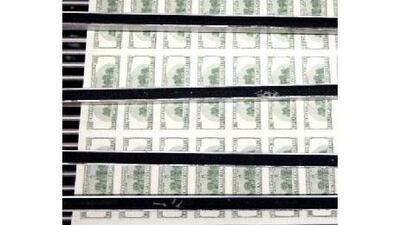There was a time when it was left to small countries to float a weak currency as they scrabbled for the crumbs of global trade. Now it seems everyone wants to do it.
Devaluation has become the tactic of the day to restore shattered wealth lost after two years of recession. The world's two largest economies, the US and China, are squaring off over currency value and commodity-based countries such as the UAE are caught in the middle. It could be a bumpy ride.
Brazil raised the flag on what central bankers have been saying for a while now in private. "We're in the midst of an international currency war," Guido Mantega, Brazil's finance minister, told industrialists recently. "Devaluing currencies artificially is a global strategy." He made his comments as the US passed a bill that would allow sanctions to be applied against countries that manipulated their currency to give exporters an advantage. Nobody doubts the bill is aimed at China, which has persistently refused US demands to allow the yuan to strengthen significantly against the dollar.
For commodity producers, the currency war is one they will hope to sit out. From gold to coal to oil - if it comes out of the ground, chances are it is bought and sold in dollars. From time to time someone tries to propose a different currency but, so far, Uncle Sam's greenback has held out. Iran, a few years ago, launched its International Oil Bourse that would accept alternative currencies, particularly the euro, for crude. So far, it has been all but ignored.
The advantage of basing commodity prices on the dollar is in its plentiful supply. The liquidity of the continuously grinding US printing presses means there is enough cash to cover the billions of dollars in commodities trade each day. Commodity economies also like a strong dollar because their costs are in local currency. South Africa's gold mines, for example, are acutely sensitive to the rand-dollar exchange rate. So much so that their share price responds as fast to the exchange rate as it does to the price of bullion.
A weak currency, then, was regarded as a right in emerging markets. But now this is changing. Emerging market currencies have gained steadily in the past couple of years. Brazil's real has seen a 28 per cent rise since October 2008, according to Bloomberg. The government has bought billions of dollars and last week introduced a tax on foreign inflows of cash to try to stem the gain. South Africa's rand has gained almost 30 per cent this year, squeezing exports and threatening the viability of many of its ageing gold mines.
What has exacerbated the situation is that interest rates in the Group of 8 countries - France, Germany, Italy, Japan, the UK, the US, Canada and Russia - are at historic lows; just last week the Bank of Japan lowered interest rates to zero. Britain, the US and Europe are not far behind. As a result, it's the small, open economies that still have relatively high interest rates where investors are now dumping their cash.
Interest rates are 10.75 per cent in Brazil, 6 per cent in South Africa and 6.5 per cent in Indonesia compared with 0.25 per cent in the US. The flat-lining investment environment in wealthy countries has resulted in a flood of money flowing into emerging markets. Investors have ploughed a record US$49.4 billion (Dh181.38bn) into emerging-market stock funds this year and $39.5bn into bond funds, EPFR Global data show.
But as swiftly as this tsunami of money arrives, it can pull back. A large-scale withdrawal could devastate a small, open economy. This is precisely what happened to Thailand in 1997, when a sudden withdrawal of billions of dollars saw the baht crash and tipped the region into a crisis that threatened to shake the global economy. The one-way money deluge, added to dollar selling by countries such as Japan, China and just about everybody else, has resulted in enormous upward pressure on emerging market currencies.
In Asia, the Bank of Thailand is trying to figure out how to stem the appreciation of the baht, now at a 13-year high against the dollar. And politicians in Indonesia, Malaysia and the Philippines have also said they would intervene to curb volatility. Precisely how they intend to do that, they have yet to say. This leaves the euro, the remaining significant currency to have escaped devaluation, in an unfortunate position. The EU, which is in the midst of a stuttering economic recovery, watched with increased dismay as the euro gained 15 per cent against the dollar and 5 per cent against the Japanese yen in the past four months, according to figures from Bloomberg. And since China's currency shadows the dollar, the euro has gone up against the yuan as well.
"If the euro continues to bear a disproportionate burden in the adjustment of global exchange rates, the recovery of the euro zone's economy might be weakened," says Olli Rehn, the European commissioner for monetary affairs. Still, the euro at least has the comfort of a sizeable economy behind it. Emerging markets, however, are acutely vulnerable to surges in cash that can cause their currency to fluctuate wildly. More than anything, an unstable currency reduces a country's ability to export. As a result, jobs are lost, the price of staple foods run rampant and social unrest inevitably follows.
This is truly unfortunate. The past decade has been especially good to the developing world. Many, such as Vietnam and Mozambique, for instance, have abandoned failed socialist economic models and encouraged entrepreneurship as a means to eradicate poverty. It would be a pity if the currency dispute between global financial giants were to spill over and cause damage to the fragile economic awakening of these countries.
As the old African saying goes: "When elephants fight, it's the grass that suffers." business@thenational.ae

